-
COMPANY DESCRIPTION
Tecnoteam is a company specialized in water treatment. The company has a group of capable technicians with over 30 years of experience in the field. Tecnoteam operates mainly in the field of primary water, with several applications in civil area, well water treatment, potable water treatment, water supply systems, swimming pools, and mostly in industrial facilities, that include agricultural, chemical, mechanical, textile and many more industries.
Tecnoteam designs and builds systems to filter and purify water, water softeners, reverse osmosis systems, all built following standard procedures as well as original and advanced procedures developed in house. We use ion-exchange processes for softening, denitrification and deionization, and we utilize membranes for water filtration, microfiltration, ultrafiltration and reverse osmosis.
In addition to those products, for which we offer an appropriate customer service, we supply dosing systems, control instruments, and chemical products needed to prevent problems associated with water systems such as corrosion, oxidation and buildups, and to control the formation of bacterial flore caused by water in technological and process systems.
The dynamic and the experience gained during the years of operation, working with local and international top companies, have helped us cast a wide net of customers. We commit together with our customers to address the problematics related to water treatment and system maintenance, with a focus on limiting the usage and waste of the nature’s precious gift of water.
Our products
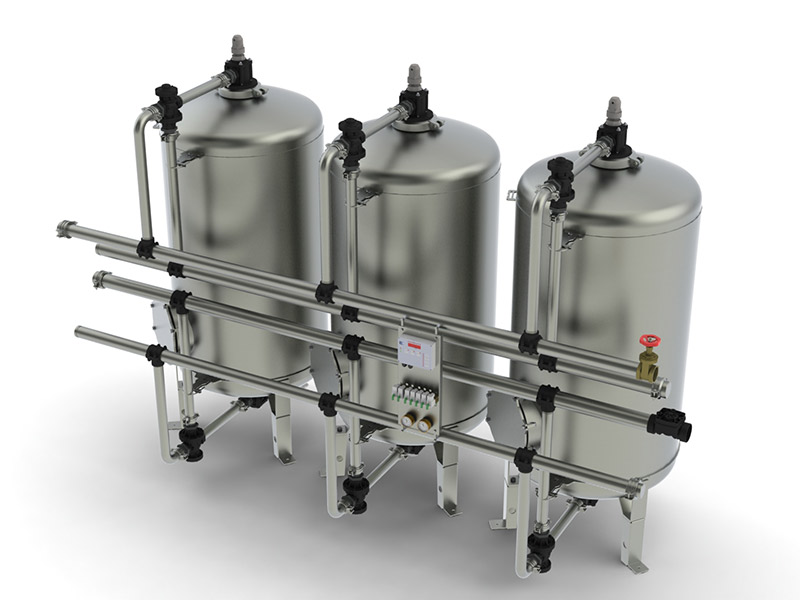
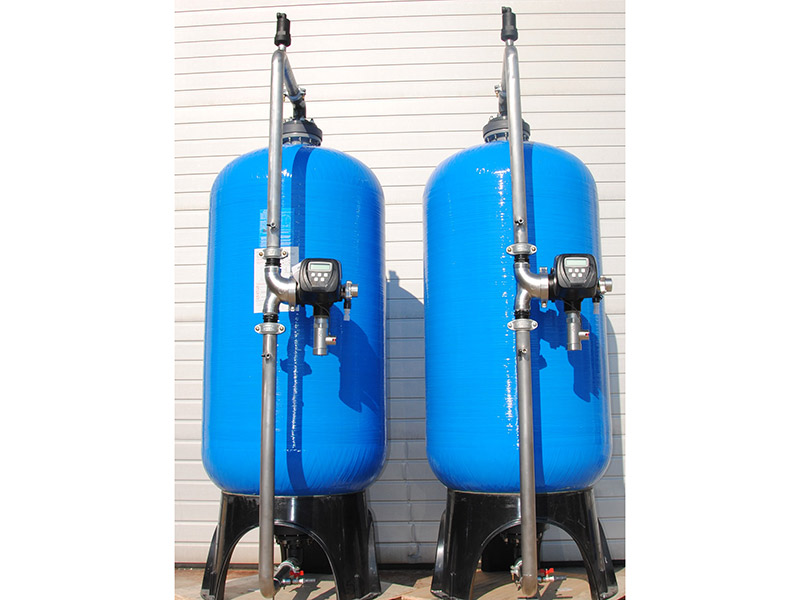
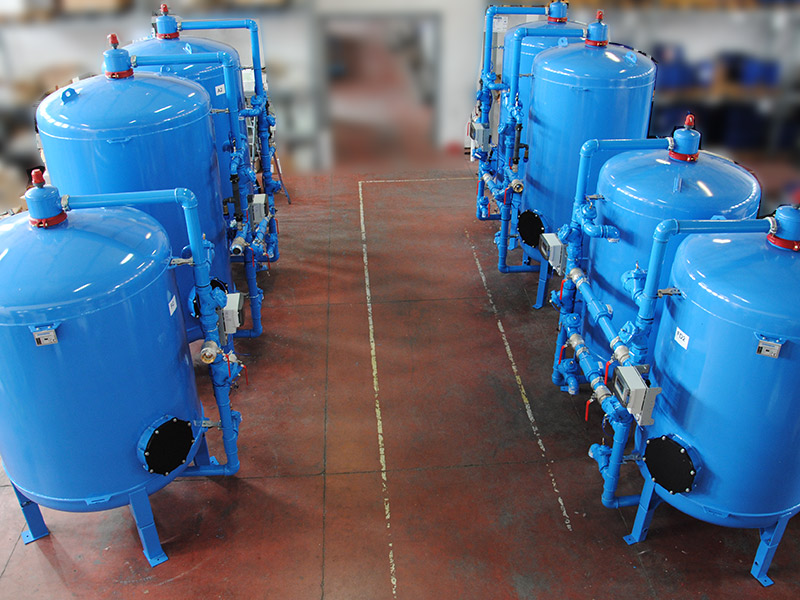
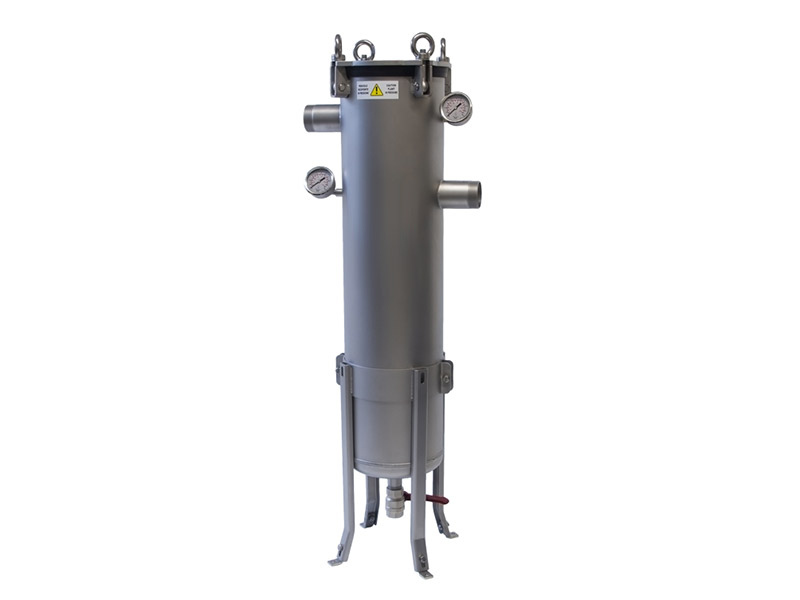
FILTRATION
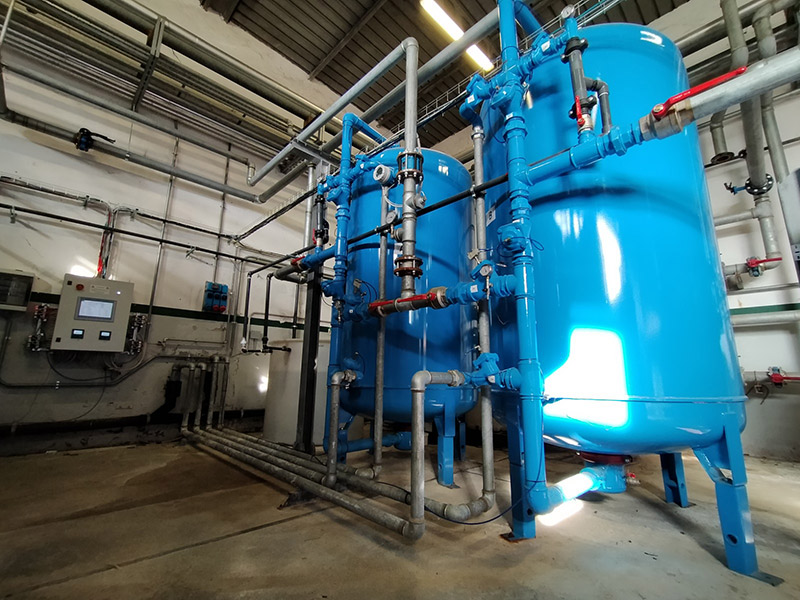
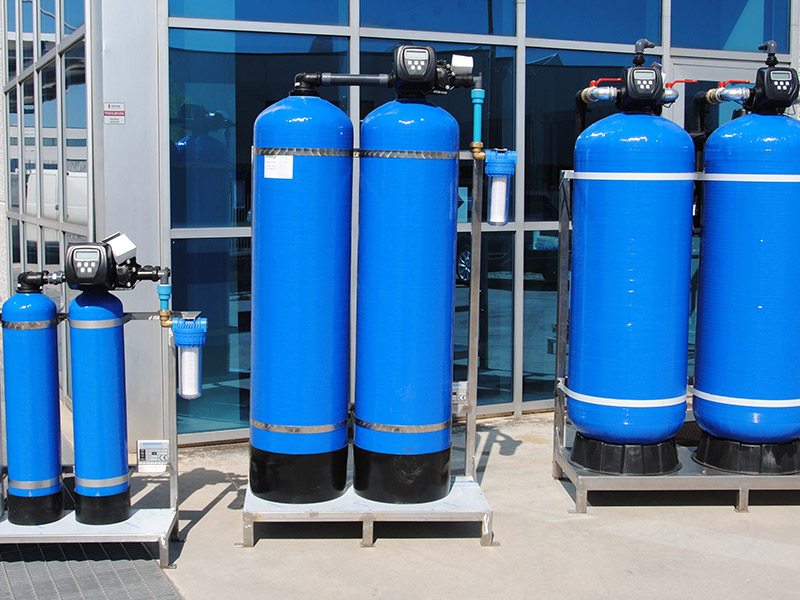
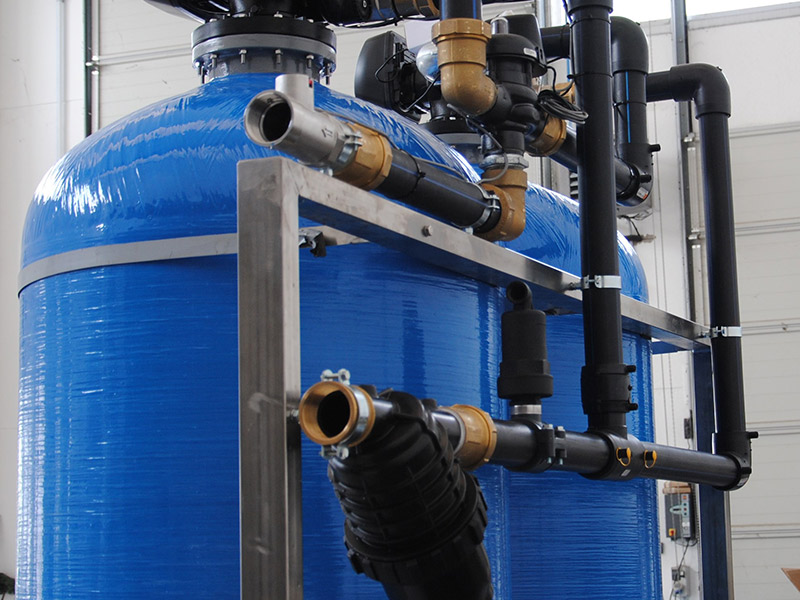
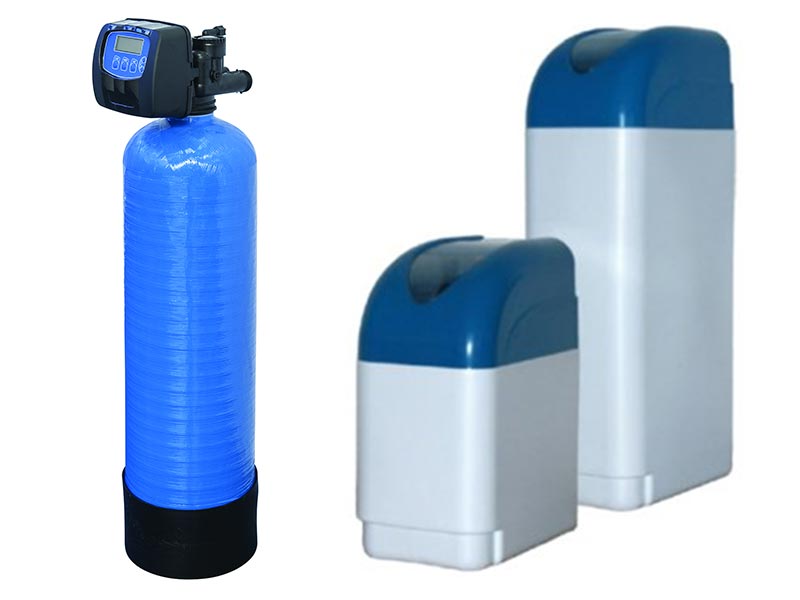
SOFTENING
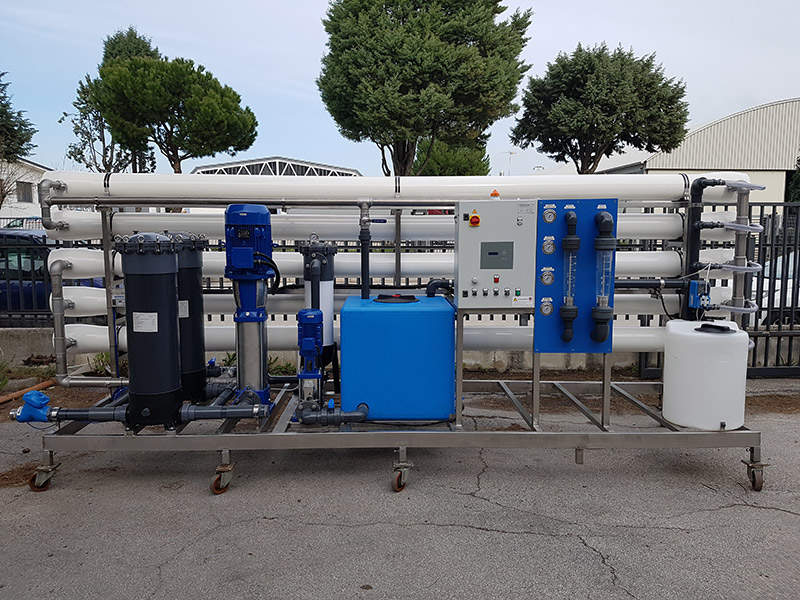
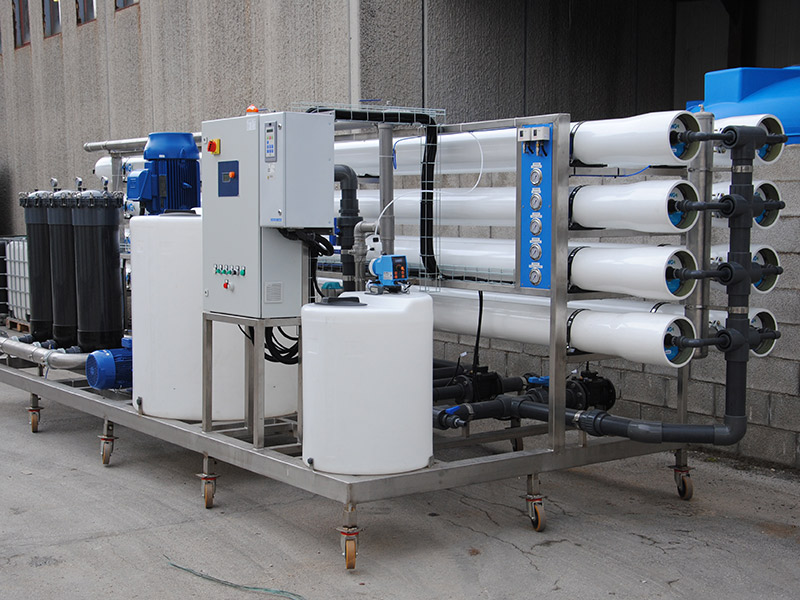
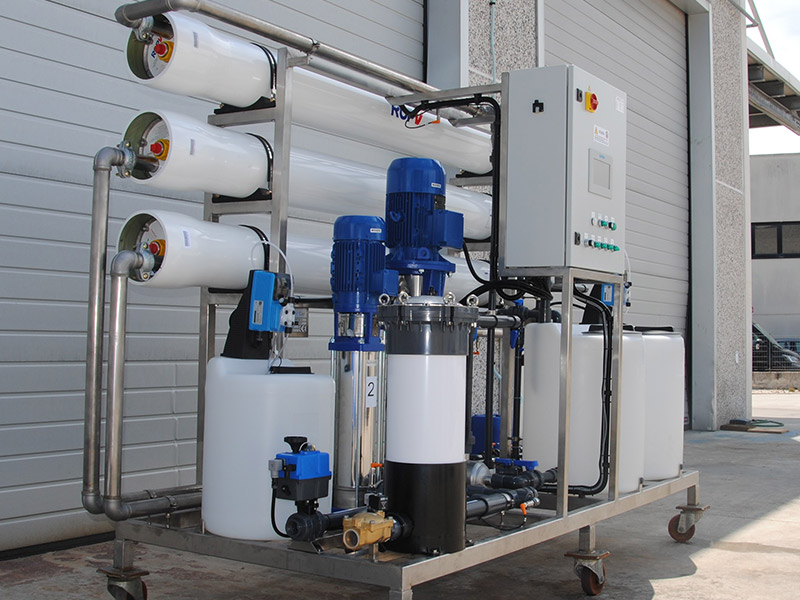
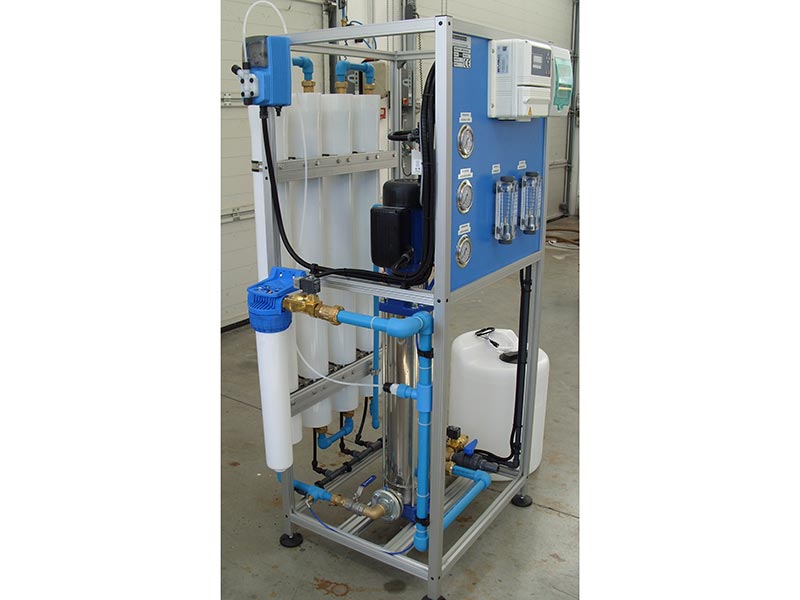
REVERSE OSMOSIS
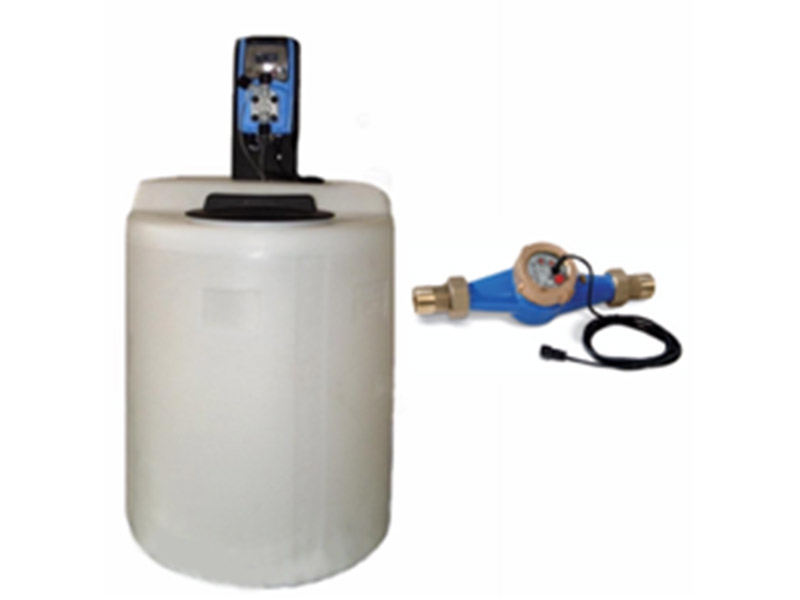
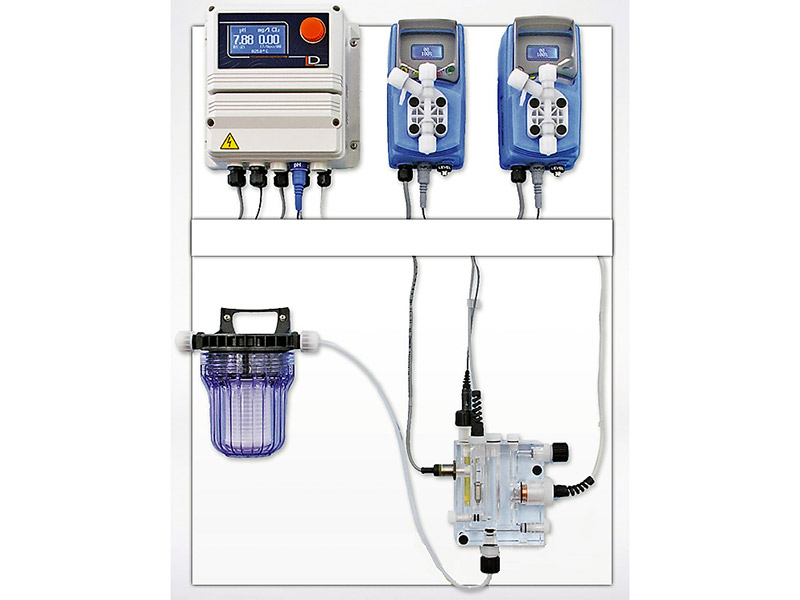
CONTROL AND DOSAGE
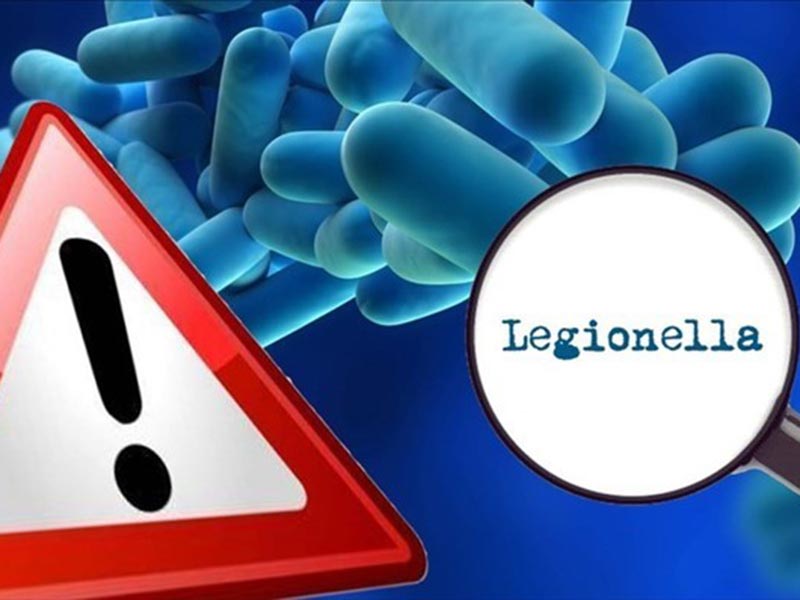
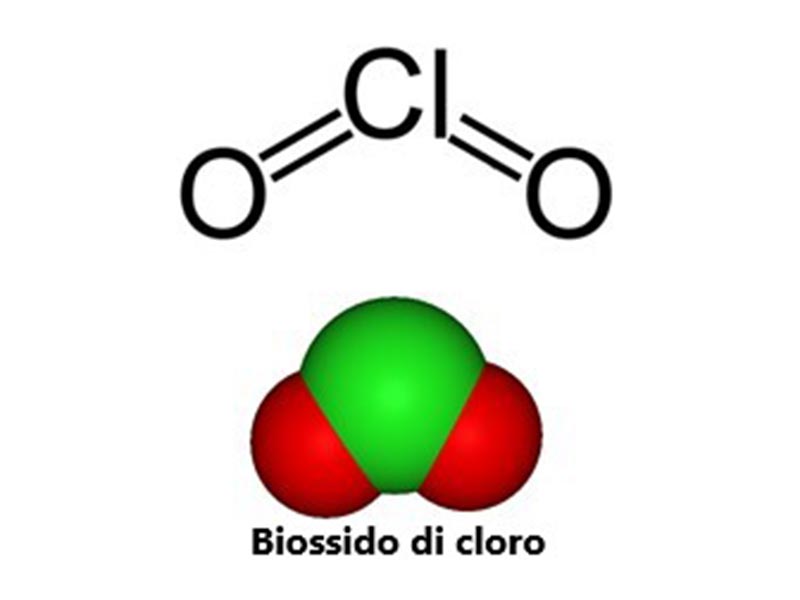
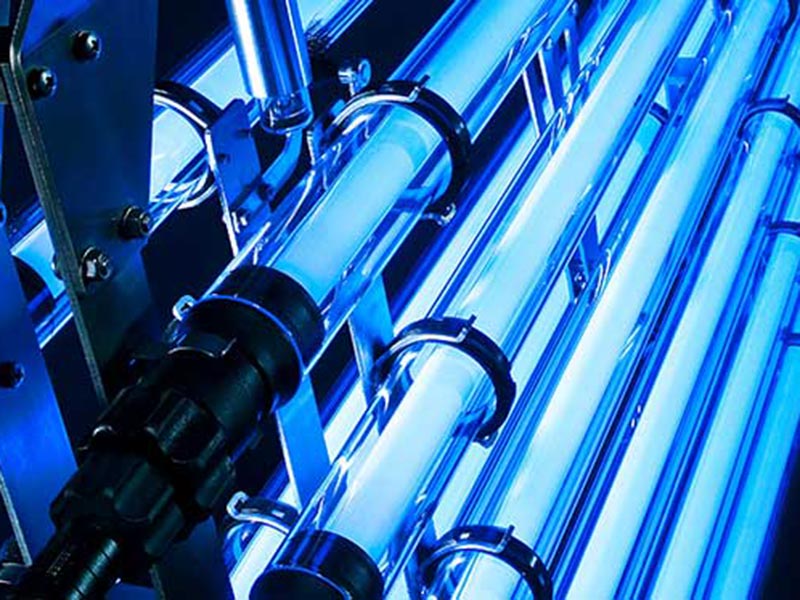
STERILIZATION AND SANITATION
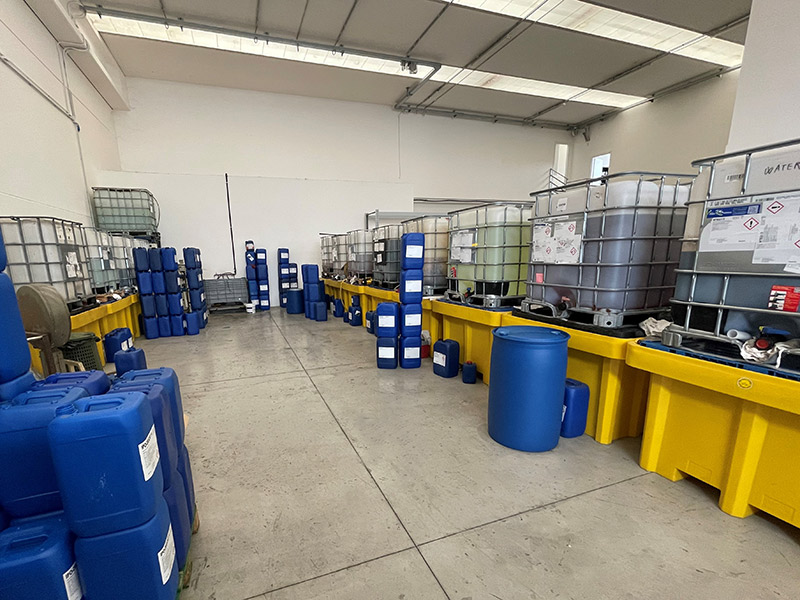
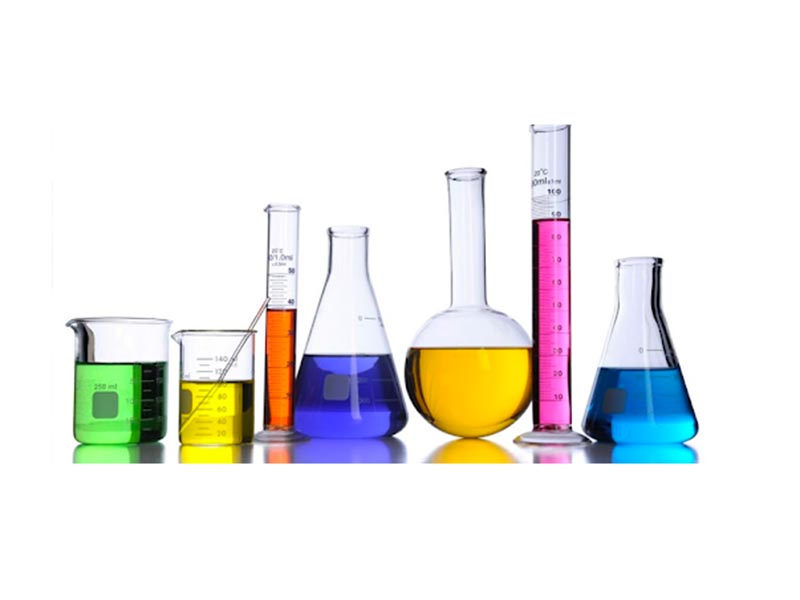
CHEMICAL CONDITIONING

-
Filtration
-
Softening
-
Reverse osmosis
-
Water sterilization
-
Dosing systems and instrumentation
-
Chemical conditioning
-
Chlorine dioxide
Filtration
The filtration process is of particular importance when dealing with water-related problems. It is used in water treatment plants, either directly as an end in itself, or as the initial treatment of a more complex system.
Filtration is the process of separating from water all the solid particles, more or less small, it contains, such as sand, clay, silt, crystalline and colloidal precipitates of insoluble salts, animal or vegetable microorganisms, organic residues.
In most cases, filtration does not involve any chemical action, as it is a mechanical separation operation, carried out with different plant engineering methods, which our company has studied, designed and created, in order to deal with the problems in a harmonious and homogeneous way, carefully assessing the nature of the impurities and their origin.
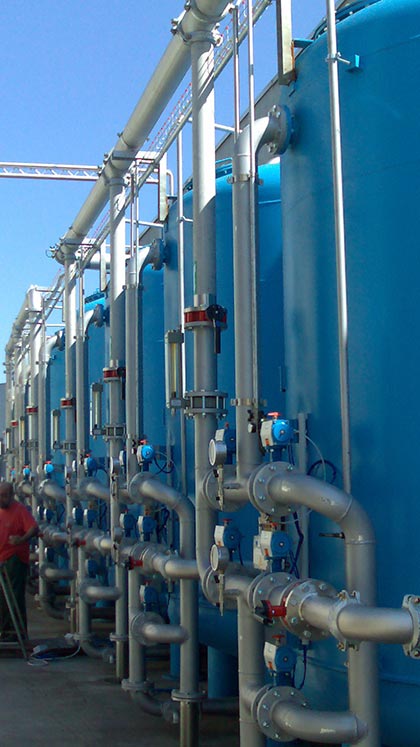
Water softening
Water softening is based on the ability of certain synthetic resins to retain calcium and magnesium ions and exchange them for sodium ions. The exchange power of these resins is exhausted after a certain amount of water has passed through them. It is therefore necessary to restore their functionality by absorbing a saturated solution of sodium chloride.
Softening is applied where high concentrations of calcium and magnesium salts cause problems, usually resulting in limescale deposits.
The formation of these deposits causes problems, especially in those users, whether domestic or industrial, where the water undergoes a change in temperature. The amount of calcium and magnesium salts contained in water determines its "hardness", which is commonly expressed in French degrees °F.
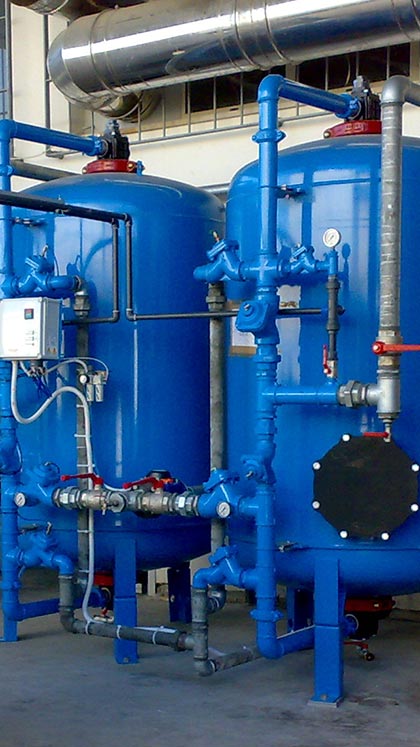
Reverse osmosis
This process takes its name from the natural phenomenon of osmosis, which allows water to pass from a less concentrated solution to a more concentrated solution through a porous septum or semi-permeable membrane, stopping at a position of equilibrium, called osmotic pressure. By applying pressure to the more concentrated solution that is higher than the osmotic pressure, the phenomenon of reverse osmosis is obtained. Reverse osmosis is therefore a design based on the use of semi-permeable membranes.
These membranes allow water to pass through, separating almost all the substances dissolved in it, up to a maximum of 99.6%, thus obtaining pure desalinated water called "permeate", and a solution rich in salts and bacteria, called "concentrate".
The construction and porosity of these membranes determine their application in reverse osmosis desalination, nanofiltration, ultrafiltration or microfiltration plants.
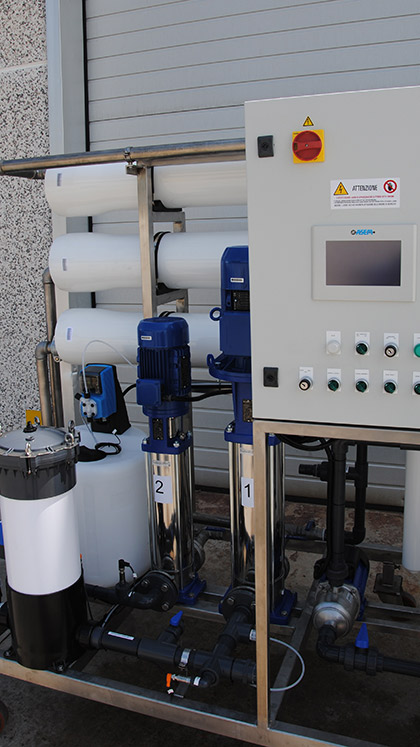
Water sterilization
The methods used for water disinfection are of a chemical or physical nature, and among these, the use of chlorine or its derivatives, ozone and ultraviolet rays are certainly the most common. All these processes are active in destroying organisms and micro-organisms present in the water. The most common use is chlorine and its derivatives, which guarantees a good reduction of the microbial load, maintaining a good disinfecting action even downstream of the treatment point, to the end-user, with a relatively high operating cost. On the other hand, the use of chlorine implies a prolonged contact time and above all,some hypotheses claim that the chlorinated organic compounds present in drinking water can be harmful to humans. Ozone, due to its high oxidising power, is also used for water sterilisation. It is generally produced from a gaseous current rich in oxygen, to which energy is added in the form of electricity, electro-chemicals or photo-chemicals.
It is also a very active oxidant and is used in drinking water treatment, aquaculture, swimming pools, wastewater and in the food sector.
The other aspect of water sterilisation involves the use of ultraviolet rays. Unlike chemical sterilization, UV rays are able to destroy micro-organisms in a natural physical process that leaves the organoleptic characteristics of the water unaltered. The absence of chemical auxiliaries makes it a highly ecological and practical product, with a very energetic and effective action against bacteria, viruses, algae, mould, etc. Recently, combined disinfection methods have been experimented with, involving the use of several systems, depending on the characteristics of the water to be treated and the needs of the users.
Another easy and safe way to sterilise water today is to use stabilised CHLORINE DIOXIDE, which is effective against all micro-organisms, from viruses to bacteria, both sporulated and vegetative, to fungi, algae and protozoa (Giardia and Cryptosporidium). The mechanism of action appears to be centred on the oxidation of the protein and lipid components of the membrane with altered cell permeability. This results in an interruption of nutrient transfer through the cell wall. Resistance phenomena are not known, so there is no need to increase dosages. It is therefore effective. The main use is the disinfection and sanitisation of water for human and animal consumption where the microbiological parameters do not fall within the limits of Legislative Decree no. 31 of 2/2/2001.
For more information see the Chlorine Dioxide page.
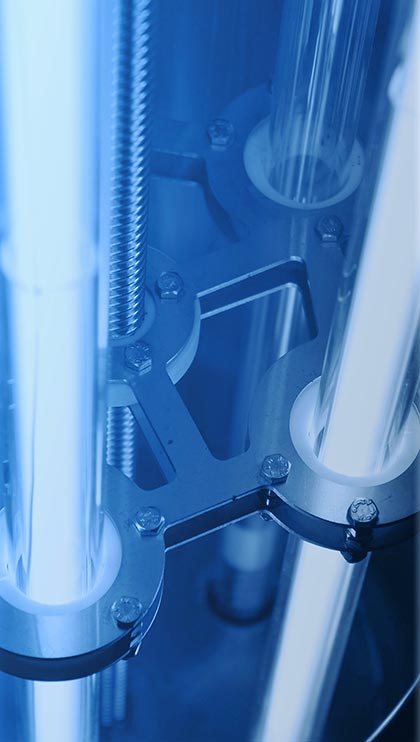
Dosing systems and instrumentation
Our range includes electromagnetic diaphragm metering pumps, available with electronic or microprocessor control, and electromechanical metering pumps, of the plunger or interposed diaphragm type.
These pumps are able to satisfy a wide range of users and unit flow rates. They can be controlled by external analogue or digital commands, by pulse counters, by control instruments such as pH meters, conductivity meters, redox potential meters, etc. They are available in different materials, compatible with aggressive liquids, whether basic or acids.
They are naturally completed or directly assembled on polyethene containers specially designed for storing the liquids to be dosed. The range of instruments includes pH meters, redox potential meters, conductivity meters, reading probes, probe holders, flow meters and temperature meters.
Our technical department is available for any requests for materials that are not listed in the catalogue.
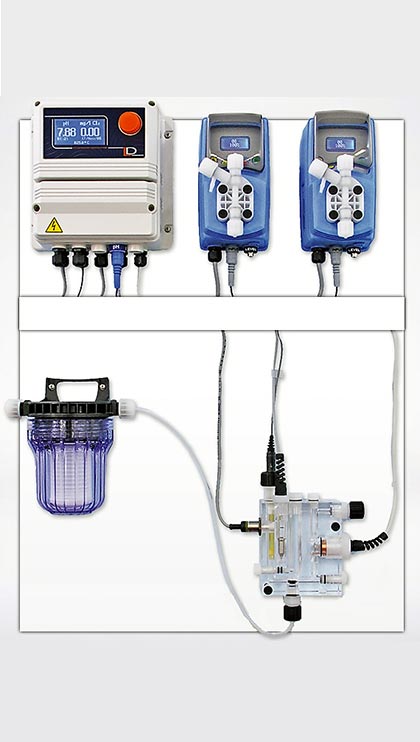
Chemical conditioning
The use of water in a technological system, or in a service circuit, can cause problems of corrosion or incrustation if not properly descaled.
Our company guarantees a complete response in water treatment, studying the interventions and measures to be adapted according to the characteristics of the water and the problems that each individual plant presents.
In this sense, in addition to the installation of the various equipment, the application of the chemical products is of considerable importance.
The range of our products is very wide and satisfies the various needs of users, our proposal ranges from antiscalants to anticorrosives, from sanitisers to special products. Our technicians are available to propose the best solution for each specific application.
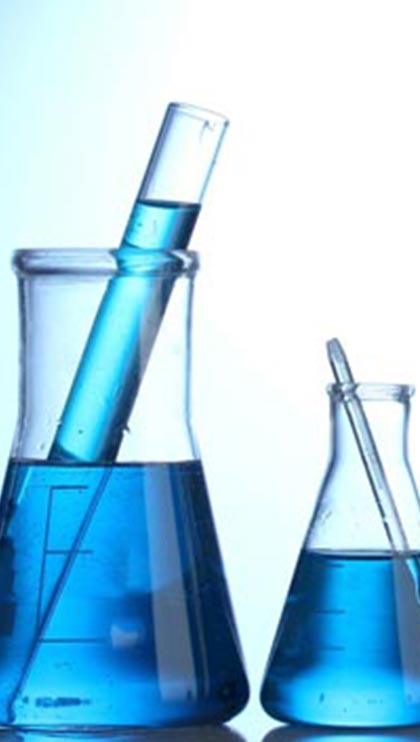
Chlorine dioxide
ACQUASKILL 5590 MIXED is a water solution product based on chlorine dioxide along with an energetic stabilized oxidant. This formula is broad-spectrum sanitization and disinfection product. It is effective in bacteria, viruses and fungi treatment and disinfection; it has been also proofed being particularly effective in Legionella Pneumophila treatment.
In specific, the chlorine dioxide is acting as suspension for the metabolic process, in the micro-organism; it is by engaging with the external side of the cellular membrane that any nutritive elements is prevented to eventually arrive to the micro organism. Chlorine dioxide causes a reaction to the amino acids present in the cytoplasm and it does help the process itself. Chlorine dioxide is high-value microbicide. It is highly effective even at low concentrations because of its unique qualities; therefore it does not need a dosage increase to act as microbicide. Chlorine dioxide does not hydrolyse when it enters water. It remains a dissolved gas in solution, therefore its germicidal activity is constant over a broad pH range.
It is due to this feature that chlorine dioxide has been recently considered an excellent disinfectant and bactericide. Especially effective in potable water disinfection for either human being or animals, chlorine dioxide is conforming to the “law decree number 31 Italian government 02/02/2001” that encompasses potable water quality degrees, to be used as drinking water.
Chlorine dioxide is a neutral chlorine compound. It is different from the elementary chlorine, it is preferred as it does not produce neither Trihalomethane (THMs) or further chlorine compounds.
The ACQUASKILL 5590 MIXED is easy to use. It is bi-part compound that responds to a formula based on 5% of A element, 5% of B element and the remaining percentage (90%) is just water. Once the product has been prepared, it gets stable for 30 days. This formula does not corrode metals at its normal concentration level and it is able to resonate with a broad pH range. The product is an higher water solubility product, compared to normal chlorine. When in contact with NH3 and NH4+, it does not alter its features. It does facilitate coagulation. It does defeat the phenols, it does not have a distinctive smell. Lastly, this particular product does remove more efficiently iron and magnesium-based compounds than normal chlorine; especially effective with high-complexity compounds.
ACQUASKILL 5590 MIXED is active as bio-film removal system that may be occurring in pipes surfaces and general surfaces using. There are neither chlorites, nor secondary compounds release out of its regular use.
Main uses:
-
Potable Water Treatment
-
Water Drainage Solution
-
Zootechnics
-
Food Manufacturing
-
Accommodation facilities and public sites

TECNOTEAM S.r.l. - Via Enzo Ferrari, 22 – Zona Ind.le “A” Civitanova Marche (MC) – 62012
CAPITALE SOCIALE €20.800,00 I.V. | N° REA: MC-138934 | NP.IVA/C.F: 01271230433 | Codice UNIVOCO: SUBM70N
PEC: tecnoteamacque@pec.it | Tel: 0733-801463 | Email: info@tecnoteamacque.it
Privacy Policy -
Cookie Policy
Hosted and Created by Clion



